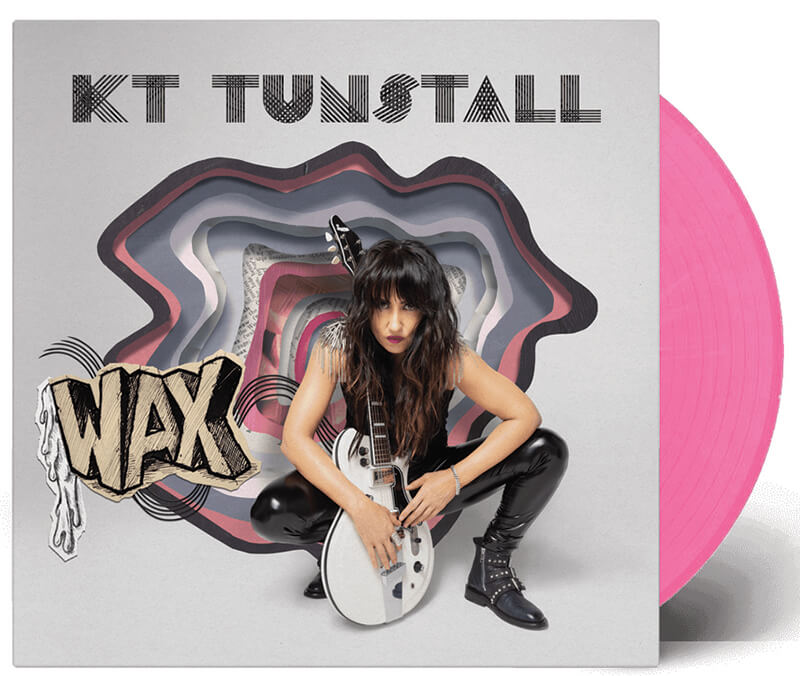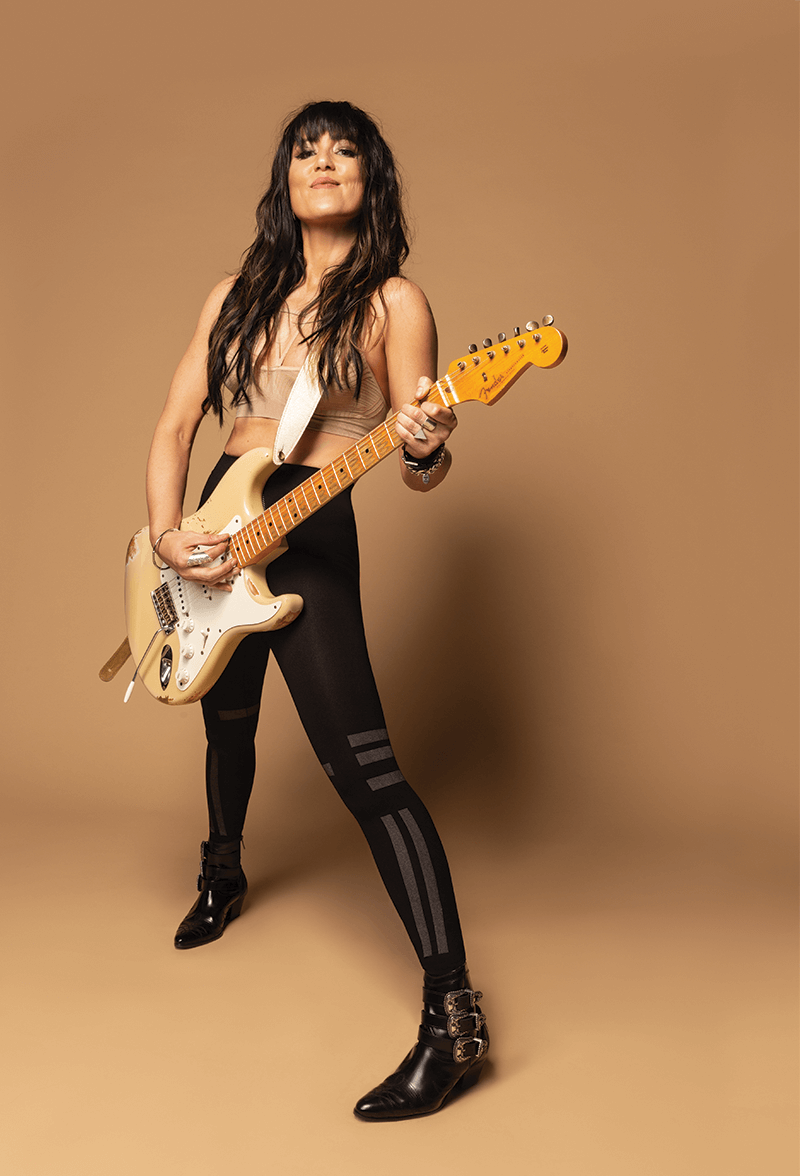“Long live vinyl!” KT Tunstall signed off on our interview, signaling her deep adoration for an age that came before her.
The singer-songwriter is known for her 2004 album Eye to the Telescope, featuring singles like “Suddenly I See,” “Other Side of the World,” and the chart-topping folk-blues stomp “Black Horse and the Cherry Tree.” Her recent endeavors offer those powerful lyrics and singular melodies that launched her career, spun into timeless-sounding pieces whose inspiration could span eras. These songs all at once feel primitive but polished, grassroots-yet-gilded. And that spirit of abandon seems to be exactly what she’s aiming for.
“It’s an exciting time for music out there,” Tunstall enthused, “it feels like the Wild West…I think it’s actually a very interesting time for musicians to carve out new ways of doing things.” Exemplifying that, earlier this year, she joined forces with Thunderpussy’s Leah Julius and Pearl Jam’s Mike McCready to put together a simple homage to political movements making change: the trio laid down a cover of Tom Petty’s “I Won’t Back Down” paired with a montage of fan-submitted protest photos, on YouTube.
She answered some questions for Performer about that track, as well as the current political climate, the direction of her work, the impact some of music’s huge losses last year had on her creative process, and the production of her newest album, WAX, being released this month.
Can you tell me about how the ‘I Won’t Back Down’ cover project came together?
Mike and I are both keen skiers, and we met whilst tearing up the slopes in Deer Valley, Utah during the Sundance Film Festival. We got on great and made a pact to record something together. We managed to carve out some time a few months ago and went down into the studio basement of his place in Seattle, along with Leah Julius of Thunderpussy (who is the bassist in said band, but also a great drummer, as proven on this track!).
We wanted to honor one of our favorite icons who had just passed, Tom Petty, and this incredible anthem from right at the tail end of the ’80s still feels so necessary today.
It was a challenge; it’s never easy to tackle a classic song. There’s no point in trying to play it the same, you have to try something original with it. I thought we did a pretty good job of making it our own version whilst still paying deep respect to [the] original. Tom had given Mike a guitar years before, so that had to go on the track, of course. Mike also provided great backing vocals, which I don’t believe he’s done a lot of before. He kept wandering around the house singing and I would shout to him, “I hear you! You’ve got the gig!”
That video is interspersed with these powerful contemporary protest photos, and there are shots of you attending the Women’s March in response to Trump’s election and inauguration– what was that like and what did it mean to you to be there?
I love the video we made for ‘I Won’t Back Down’; we asked fans to send in all their video footage and photographs from all the different peaceful protests they had attended all over the world. It’s very emotional to watch.
I was extremely proud to be present at the Women’s March in DC in 2017. I’ll never forget being on a plane from LA to DC that was basically all women, travelling to stand up for equality and basic human rights. It was an incredibly positive environment, even in the face of dark times.
The best moment for me is the footage at the end of a guy with a placard that says, “WE WON’T BACK DOWN.” So perfect.
And the proceeds benefit Pearl Jam’s Vitalogy Foundation. What social issues do you feel are most crucial right now and how do you think our protests and movements advance change?
I just feel very strongly that everybody should have access to opportunities which help them reach their highest potential in life. Our modern societies often aren’t structured to allow people to experience that. Coming from the UK where there is certainly more of a support structure with welfare for all, maternity and paternity leave, and most importantly free healthcare, it can be very disturbing seeing how many people can so easily fall through the cracks and feel forgotten.

I think for me, the most important area is to support and nurture children. To give children that solid foundation of confidence and love and safety, can and does produce the most amazing adults, regardless of their background.
Peaceful protest and disruption is an extremely important right in a democracy; we should all remember how precious that right is, and in my opinion the most powerful acts of protest are when we cross barriers of gender, race, of age, background, creed, and support one another to lift each other up.
I read that before KIN, you considered moving solely into writing music for movies and even entering the Sundance Institute’s elite Film Composers Lab. You have worked in score before, most recently, I think, for ‘Bad Moms.’ Is there still that consideration?
The Sundance Institute Film Composers Lab was probably the steepest learning curve of my adult life; I absolutely loved it. Six of us were tutored by luminaries such as James Newton Howard, Harry Gregson-Williams, and Alan Silvestri. It was so fantastic to learn a completely different craft and to flex completely different creative muscles.
What’s different for you in producing art to support someone else’s art?
I suppose the biggest difference is that you’re working for someone else; the director. It is a very collaborative process, which can be good and bad…Film scores can be very liberating in that I don’t have to create material that fits under the banner of ‘KT Tunstall.’
For example, a short film I scored called ‘Be As You Wish To Seem’ has an entirely electronic score; very dark and disturbing sounding – loved making it! I’m still very actively scoring music for film, and I’ve also just started writing a musical in London, so I certainly feel I’m branching out into different creative areas.
WAX is the second album in this KIN trilogy concept you’ve introduced: three individual albums exploring soul, body, and mind, respectively. How did you arrive at this idea and how do you see it coming together as a single body of work: as in, what sort of time frame do you envision this spanning, and how would you eventually like the three albums packaged, distributed, and experienced? I’m thinking of very big conceptual pieces like the Pink Floyd’s The Wall album/film/tours.
Yes! A film, an interactive theatre experience, a massive inflatable farmyard animal! I want to do it all!!
After releasing KIN, it dawned on me that this album was all about coming through difficulty in life and actually being better for it; feeling stronger and more compassionate and wiser as a person: a phoenix from the ashes. It was all about the ‘soul.’

I knew that this next record WAX would be an electric guitar record and would be ‘the body album.’ I very much felt the need to make a rock record after writing the song ‘The Healer’, which had been on a 3-track EP before KIN was released and became a real crowd favorite.
I read that KIN, the first album, fulfills the trilogy’s theme of ‘soul’, but having read that you were adopted, I have to wonder if the title KIN also alludes plainly to family, both by birth and by choice?
I wanted to call the record KIN for several reasons. First of all, because I wanted each record in the trilogy to have three letter titles. Secondly, because as you rightly say, family relationships can be easily equaled by deep friendships, and we live in a time of such insane levels of communication, yet still have to be diligent that we stay truly connected to one another.
Thirdly, it is about the feeling I have when I’m with 100, 1000, 10,000 people, and we close the doors, or we celebrate communing with nature outdoors at a festival, and we share that amazing one-off experience of playing and enjoying music together. It’s a very special thing.
Music is such a powerful enhancer in our lives – forming life-long bonds between people, and all the important moments of our lives tend to have a soundtrack. The passing on of music within families and friends is what folk and blues music is; storytelling, and the sharing of memories.
Where did the choice for WAX as a title come from? Is the third album title of the trio already determined, representing the concept of ‘mind’?
WAX describes very physical things to me. Bees, candlelight, music being pressed onto old wax cylinders, statues of human beings that look so incredibly lifelike and almost have a life-glow to them, and of course wax being produced inside your own head…
There is no escape from the word having intensely physical connotations.
WAX was produced by Nick McCarthy, formerly of Franz Ferdinand — can you describe working with him in that capacity?
Nick is an extremely talented musician, I obviously knew he was a brilliant player, but wasn’t aware of his rating scale…I think I was very inspired by his style and his own artistic approach to recording. It was very lo-fi and free, and I love it.
What was the most valuable input you can recall that he offered that maybe you hadn’t come to yet on your own, something that really felt like a game-changer for the album?
I do think it was his writing. It’s very unusual to find writing partners who allow you to go out into the world and sing songs that you’ve written with someone else and feel they are just as personal as the ones you’ve written alone. Nick is probably the only second person after Martin Terefe (who I wrote ‘The River’ with), who I’ve managed to achieve that with. Albums are all about having great songs on them from start to finish, and he really helped make that happen on this record.
What I really liked about it was working with an active artist. There’s more than a bit of madness in the mix when you work with an artist’s producer, it’s great.

You are quoted as saying, “…My earliest memories are Californian…”, attributed to a sabbatical that your father took at UCLA in 1979. Then KIN was recorded in Los Angeles. Where was WAX recorded, and what are your connections to where it was made?
WAX was recorded live between Nick McCarthy’s East London studio and MyRiot’s West London studio. It is definitely significant that this record was made in London; it’s an angular, rhythmic rock record, and I very much appreciated that British influence on what I was making.
With WAX’s focus on the physical presence, tell me about the physicality of “The Night That Bowie Died.”
Nick had written some chords on the actual night that Bowie passed away and saved them in a folder on his computer and gave the folder that name. When it came to writing a song with the chords, he said, “We can change the name of it no problem,” and I said “No, I love it! We should use that as the name”: which is interesting, because we would probably never have chosen that as a song title.
We talked about Bowie passing causing this global heave of sadness, and how it seemed to remind you of all the people you had ever lost. We got very emotional writing that song, and actually had to step outside at one point to pull our shit together!
Any upcoming projects or other contributions worth noting?
I am excited to share that I am currently involved in writing and recording project with the great Suzi Quatro. We met in London many years ago, and she commented at the time that she felt that I was carrying on the work she started. The songs are sounding great and we are loving being in the studio together. We don’t have a solid plan for release yet, but it will happen.
